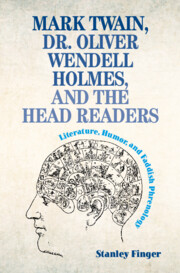 Mark Twain, Dr. Oliver Wendell Holmes, and the Head Readers
Mark Twain, Dr. Oliver Wendell Holmes, and the Head Readers Book contents
- Mark Twain, Dr. Oliver Wendell Holmes, and the Head Readers
- Mark Twain, Dr. Oliver Wendell Holmes, and the Head Readers
- Copyright page
- Epigraph
- Contents
- Tables and Figures
- Preface
- 1 The Birth of a Controversial Doctrine
- 2 Coming to America
- 3 Skeptical in Hannibal
- 4 The River, the West, and Phrenology Abroad
- 5 Mark Twain’s “Small Test”
- 6 Tom, Huck, and the Head Readers
- 7 More Head Readings and a Phrenological Farewell
- 8 Young Holmes and Phrenology in Boston
- 9 An American in Paris
- 10 Quackery and Holmes’s Head Reading
- 11 Holmes’s Professor on “Bumpology”
- 12 Holmes’s “Medicated Novels”
- 13 Mr. Clemens and Dr. Holmes
- 14 Phrenology Assessed
- Epilogue
- References
- Index
12 - Holmes’s “Medicated Novels”
Published online by Cambridge University Press: 17 April 2023
- Mark Twain, Dr. Oliver Wendell Holmes, and the Head Readers
- Mark Twain, Dr. Oliver Wendell Holmes, and the Head Readers
- Copyright page
- Epigraph
- Contents
- Tables and Figures
- Preface
- 1 The Birth of a Controversial Doctrine
- 2 Coming to America
- 3 Skeptical in Hannibal
- 4 The River, the West, and Phrenology Abroad
- 5 Mark Twain’s “Small Test”
- 6 Tom, Huck, and the Head Readers
- 7 More Head Readings and a Phrenological Farewell
- 8 Young Holmes and Phrenology in Boston
- 9 An American in Paris
- 10 Quackery and Holmes’s Head Reading
- 11 Holmes’s Professor on “Bumpology”
- 12 Holmes’s “Medicated Novels”
- 13 Mr. Clemens and Dr. Holmes
- 14 Phrenology Assessed
- Epilogue
- References
- Index
Summary
Holmes also presented his thoughts about phrenology and its purveyors in what he called his three “medicated novels,” which also began as serials in the Atlantic Monthly before coming out as books. The first was Elsie Venner, published as a book in 1861. The Guardian Angel followed in 1867 and A Mortal Antipathy in 1885. In these three works, he asks pertinent questions, such as whether people with mental disabilities are morally responsible and are accountable for their crimes. He is bothered by how the insane rarely received proper attention from physicians or compassion and understanding from the public. Another common theme is how mental traits can be transmitted through multiple generations. These were the same issues that the founders of phrenology raised, and he is in agreement with them. Yet he also states that phrenology “has failed to demonstrate its system of special correspondences.” That is, its system of bumps is worthless or, as put by the brilliant Lurida Vincent, “nonsense.” This chapter concludes with what a leading phrenologist wrote about Holmes after he died in 1894. He felt Holmes was a gifted writer, yet, and as might be expected, one very much mistaken about phrenology being a pseudoscience.
Keywords
- Type
- Chapter
- Information
- Mark Twain, Dr. Oliver Wendell Holmes, and the Head ReadersLiterature, Humor, and Faddish Phrenology, pp. 245 - 256Publisher: Cambridge University PressPrint publication year: 2023


